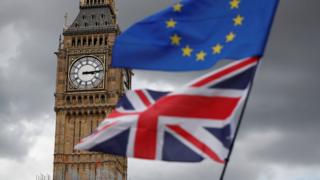UK’s credit rating downgraded by Moody’s
 Image copyright
Image copyright
Reuters
The UK’s credit rating has been cut over concerns about the UK’s public finances and fears Brexit could damage the country’s economic growth.
Moody’s, one of the major ratings agencies, downgraded the UK to an Aa2 rating from Aa1.
It said leaving the European Union was creating economic uncertainty at a time when the UK’s debt reduction plans were already off course.
Downing Street said the firm’s Brexit assessments were “outdated”.
The other major agencies, Fitch and S&P, changed their ratings in 2016, with S&P cutting it two notches from AAA to AA, and Fitch lowering it from AA+ to AA.
Moody’s said the government had “yielded to pressure and raised spending in several areas” including health and social care.
It says revenues were unlikely to compensate for the higher spending.
The agency said because the government had not secured a majority in the snap election it “further obscures the future direction of economic policy”.
It also said Brexit would dominate legislative priorities, so there could be limited capacity to address “substantial” challenges.
It added “any free trade agreement will likely take years to negotiate, prolonging the current uncertainty for business”.
Moody’s has also changed the UK’s long-term issuer and debt ratings to “stable” from “negative”.
Moody’s stripped Britain of its top-notch AAA rating in 2013.
The government said the latest downgrade followed a meeting on 19 September, and did not consider the prime minister’s speech on Friday, in which she outlined her vision for Brexit.
“The prime minister has just set out an ambitious vision for the UK’s future relationship with the EU, making clear that both sides will benefit from a new and unique partnership,” it said.
“The foundations on which we build this partnership are strong.”
It said it had a robust economic record and had made substantial progress in reducing the deficit.
“We are not complacent about the challenges ahead, but we are optimistic about our bright future.”
Credit rating agencies, in essence, rate a country on the strength of its economy – scoring governments or large companies on how likely they are to pay back their debt.
A rating downgrade can affect how much it costs governments to borrow money in the international financial markets. In theory, a high credit rating means a lower interest rate, and vice versa.

